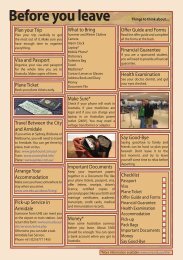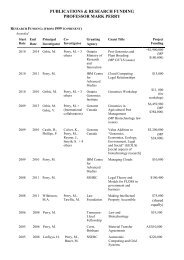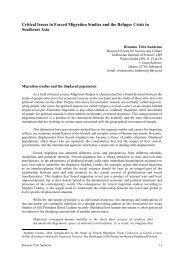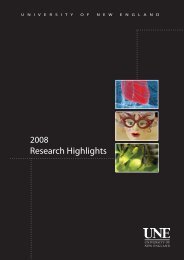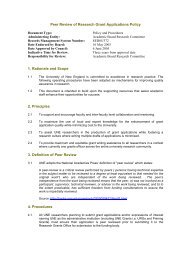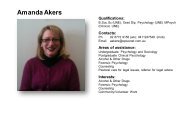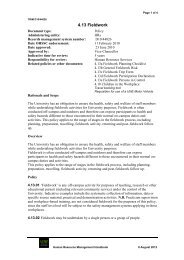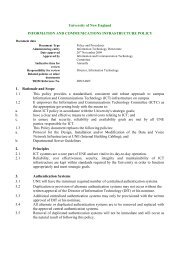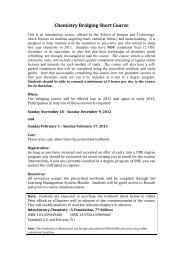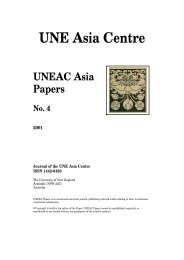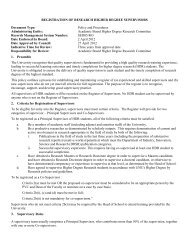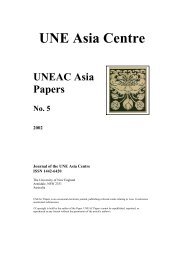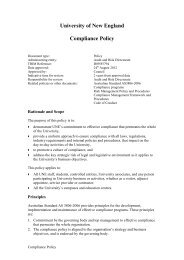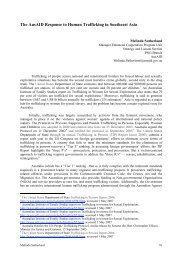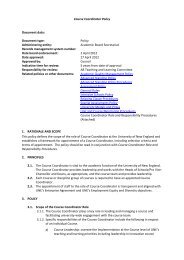International Student Handbook - University of New England
International Student Handbook - University of New England
International Student Handbook - University of New England
You also want an ePaper? Increase the reach of your titles
YUMPU automatically turns print PDFs into web optimized ePapers that Google loves.
Examinations<br />
Examinations (exams) will be held at the end <strong>of</strong> semester. Exams are generally written, and can be in a<br />
number <strong>of</strong> formats: short essays, multiple choice questions, short answers or a combination <strong>of</strong> all three.<br />
Lecturers in your subjects/units will tell you what you need to do to prepare for exams.<br />
Exam revision<br />
You need to plan to revise for your exams. When you get your exam timetable, you should make a plan<br />
that allows you to revise properly, not in a rush the night before. If you need help to plan for exams, you<br />
should visit the Academic Skills Office website, or make an appointment with ISBT staff for a consultation.<br />
Time management<br />
You need to plan your time effectively in order to keep up with your studies and assignments. Planning<br />
your time becomes especially important in revising for exams. The following suggestions will help you<br />
plan your time well. A student planner may be helpful and can be found at:<br />
www.une.edu.au/tlc/aso/students/publications/planners.php<br />
Your class contact hours are not the only time you need to spend on your studies. In some degrees you<br />
may have only twelve class contact hours per week. In courses such as these, you need to spend<br />
another three hours in private study per every hour <strong>of</strong> class contact time. A minimum <strong>of</strong> 36 hours <strong>of</strong><br />
classes and private study per week is needed to make sure you do well in your degree. In degrees with<br />
higher class contact hours, you should ask your teachers what amount <strong>of</strong> private study they believe is<br />
necessary for you to do well.<br />
Sit down and make a plan for your week. Allocate time for classes, private study, chores, paid work,<br />
social life, recreation, and community commitments. Make sure the plan takes into account when your<br />
assignments and essays are due. If you follow the plan every week, you will not have to rush to get<br />
essays finished. One <strong>of</strong> the worst ways to study is to leave everything to the last minute. It means you will<br />
be constantly stressed and never be able to relax and enjoy time away from studying.<br />
Plagiarism - (can be intentional or unintentional)<br />
All students need to be aware <strong>of</strong> plagiarism as it can result in exclusion from their course. „Plagiarism‟ is<br />
the term used to describe intentionally or unintentionally representing the work <strong>of</strong> other people as your<br />
own, without due acknowledgement. In short, it is intellectual theft, and it applies to the words, images,<br />
research, and thinking <strong>of</strong> others. Plagiarism involves giving the impression that a student has thought,<br />
written or produced something that has, in fact, been taken from another person. You avoid plagiarism<br />
by adhering to the <strong>University</strong>‟s referencing guides. If you learn how to reference your sources properly,<br />
you will not commit plagiarism inadvertently. The referencing guide can be found at<br />
www.une.edu.au/tlc/aso/students/publications/referencing.php<br />
If you consciously decide to present someone else‟s work as your own, you run the risk <strong>of</strong> being caught<br />
and excluded from your degree and having your visa cancelled. All students should read the<br />
<strong>University</strong>‟s policy on plagiarism. It is available at: www.une.edu.au/policies/academic/php<br />
To avoid plagiarism you must always:<br />
1. Cite your source - acknowledge the source <strong>of</strong> your ideas with correct references; and<br />
2. Either paraphrase or use a direct quote - paraphrasing means putting ideas and information<br />
into your own words. A direct quote is the use <strong>of</strong> exact words or phrases from your source, and is<br />
fully acknowledged and referenced.<br />
A further explanation <strong>of</strong> plagiarism for students who are unfamiliar with Australian assessment methods<br />
can be found on the following website:<br />
www.cshe.unimelb.edu.au/assessinglearning/docs/Int<strong>Student</strong>s.pdf<br />
UNE-ISBT 2009-2010 <strong>International</strong> <strong>Student</strong> <strong>Handbook</strong> Page 32



